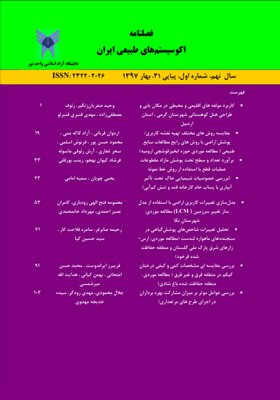بررسی خصوصیات شیمیایی خاک تحت تأثیر آبیاری با پساب خام کارخانه قند و تنش کمآبی
محورهای موضوعی : کشاورزی
1 - دانشجوی دکتری دانشگاه علوم کشاورزی گرگان
2 - گروه مهندسی آب دانشگاه تبریز
کلید واژه:
چکیده مقاله :
نیاز روز افزون به منابع آبی و به دنبال آن کمبود آب، ضرورت استفاده از آب های نامتعارف بهخصوص پسابها را افزایش داده است. در پژوهش حاضر به بررسی خصوصیات شیمیایی خاک تحت آبیاری با پساب خام کارخانه قند و تنش کمآبی با به کارگیری سه روش آبیاری شامل آب چاه (T1)، پساب خام کارخانه قند (T2)، ترکیب آب و پساب (با نسبت اختلاط 1 به 7) (T3) با دو سطح آبیاری کامل (L1) و اعمال 75% تنش کم آبی (L2) بهصورت فاکتوریل با طرح پایه بلوک کامل تصادفی در چهار تکرار (R) بهصورت آزمایشات مزرعهای در اراضی شهرستان میاندوآب در سال زراعی 96-1395 پرداخته شد. نتایج حاصله نشان داد تنش کمآبی و نوع آب آبیاری بر یونهای پتاسیم، فسفر، ازت کل و شوری در سطح احتمال یک درصد، و بر میزان اسیدیته در سطح احتمال 5 درصد تأثیر معنیدار داشته است. بیشترین و کمترین مقدار یون پتاسیم به ترتیب در تیمارهای T2L2 و T3L1 با مقادیر 289 کیلوگرم و 112 کیلوگرم حاصل شد. هم چنین بیشترین و کمترین مقدار اسیدیته به ترتیب در تیمارهای T2L2 و T2L1 با مقادیر 5/7 و 9/6 مشاهده شد. در حالت کلی میتوان اظهار داشت که آبیاری با پساب خام کارخانه قند به طور تقریبی خصوصیات شیمیایی خاک را بهبود میبخشد و با توجه به کمبود منابع آبی جایگزین مناسبی برای آبیاری مزارع جو منطقه مورد بررسی توصیه می گردد.
The increasing water demand and water scarcity has increased the need for unconventional water, especially wastewater. In this research, the soil chemical properties under irrigation with sugar factory raw wastewater and water stress in a factorial experiment with a randomized complete block design with four replications (R) was carried out in a field experiment in Miandoab city during 2016-2017 and the treatments in this study were three treatments: well water (T1), sugar plant wastewater (T2), water and wastewater (87.5% water and 12.5% wastewater) (T3) combination with two full irrigation levels (L1) and 75% water stress (L2). that water stress and type of irrigation water had a significant effect on potassium, phosphorus, total nitrogen and salinity at 1% probability level and on acidity at 5% probability level. The highest amount of potassium in T2L2 and T3L1 treatments with 289 and 112 Kg was obtained. Also, The highest amount of acidity in T2L1 and T2L2 treatments with 7.5 and 6.9 was observed. Originally, it can be stated that Irrigation with Sugar Factory Raw Wastewater approximately improves soil chemical properties and due to the water resources scarcity, an appropriate replacement for irrigation of Barely fields is recommended.

